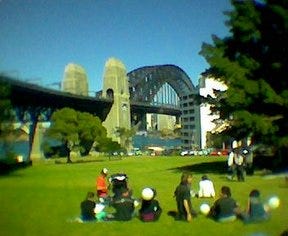

There had been so many demonstrations that they had taken on a picnic like atmosphere; hard to believe anymore that their claims were true; or that anyone cared. He paused, notebook in hand, representative of the right wing press, the unconverted; and they spilled forth their beliefs. The march went through the streets of Kirribili to the Prime Minister's dwelling. There was never going to be any threat; or danger. These demonstrations were entirely within the accepted domain, ritual protests over subjects most of the population couldn't care less about.
I haven't had any internet for more than a month as I've struggled to switch to broadband. It's been the most ridiculous drama; so boring I can barely talk about it; but frustrating; life on hold; so many things to do and impossible to do them all. I wanted to be free but didn't know how to begin. I wanted to start anew but creeping fear kept me transfixed in one spot. I wanted to be sure things worked; but they never did. It was just impossible; dealing with Digiplus; Telstra; they were all providers that didn't provide. For days I just couldn't get the damned thing to work at all.
This is just an experiment, sad sometimes; but true; and then just moments when he was determined to make a difference. He wanted to curl up and say goodbye. He wanted to start again. He wanted comfort where there was none. He wanted to be safe and all he could find was doubt. These stories made little sense. The protestors marched through the streets; united in their simple beliefs, in their opposition to the government of the day, to their noble causes. And he didn't know where to stop; or what now to believe. We were caught tight; but none of these things made sense to any but the very wise.
Today's story:
http://www.truthdig.com/dig/item/20060627_occupation_iraq_hearts_minds/
In reality both Abu Ghraib and Haditha were merely more extreme versions of the day-to-day workings of the American occupation in Iraq, and what makes them unique is not so much how bad they were, or how embarrassing, but the fact that they made their way to the media and were publicized despite attempts to cover them up. Focusing on Abu Ghraib and Haditha distracts us from the daily, little Abu Ghraibs and small-scale Hadithas that have made up the occupation. The occupation has been one vast extended crime against the Iraqi people, and most of it has occurred unnoticed by the American people and the media.
Americans, led to believe that their soldiers and Marines would be welcomed as liberators by the Iraqi people, have no idea what the occupation is really like from the perspective of Iraqis who endure it. Although I am American, born and raised in New York City, I came closer to experiencing what it might feel like to be Iraqi than many of my colleagues. I often say that the secret to my success in Iraq as a journalist is my melanin advantage. I inherited my Iranian father’s Middle Eastern features, which allowed me to go unnoticed in Iraq, blend into crowds, march in demonstrations, sit in mosques, walk through Falluja’s worst neighborhoods. ...
The raids began at night. The men descended upon villages by the border with Syria in the western desert. After half an hour of bumpy navigating in the dark the convoy approached the first house and the vehicles switched their lights on, illuminating the target area as a tank broke the stone wall. “Fuck yeah!” cheered one sergeant, “Hi honey I’m home!” The teams charged over the rubble from the wall, breaking through the door with a sledgehammer and dragging several men out. The barefoot prisoners, dazed from their slumber, were forcefully marched over rocks and hard ground. One short middle-aged man, clearly injured and limping with painful difficulty, was violently pushed forward in the grip of a Brobdingnagian soldier who said, “You’ll fucking learn how to walk.” Each male was asked his name. None matched the names on the list. A prisoner was asked where the targeted military officer lived. “Down the road,” he pointed. “Show us!” he was ordered, and he was shoved ahead, stumbling over the rocky street, terrified that he would be seen as an informer in the neighborhood, terrified that he too would be taken away. He stopped at the house but the soldiers ran ahead. “No, no, it’s here,” yelled a sergeant, and they ran back, breaking through the gate and bursting into the house. It was a large villa, with grape vines covering the driveway. Women and children from within were ordered to sit in the garden. The men were pushed to the ground on the driveway and asked their names. One was indeed the first high-value target. His son begged the soldiers, “Take me for 10 years but leave my father!” Both were taken. The children screamed ‘Daddy, Daddy!’ as the men were led out and the women were given leaflets in Arabic explaining that the men had been arrested.
As the main element departed, the psychological operations vehicle blasted AC/DC rock music through neighborhood streets.
Home after home met the same fate. Some homes had only women; these houses too were ransacked, closets broken, mattresses overturned, clothes thrown out of drawers. Men were dragged on the ground by their legs to be handcuffed outside. One bony ancient sheik walked out with docility and was pushed forcefully to the ground, where he was wrestled by soldiers who had trouble cuffing his arms. A commando grabbed him from them, and tightly squeezed the old man’s arms together, lifting him in the air and throwing him down on the ground, nearly breaking his fragile arms.



